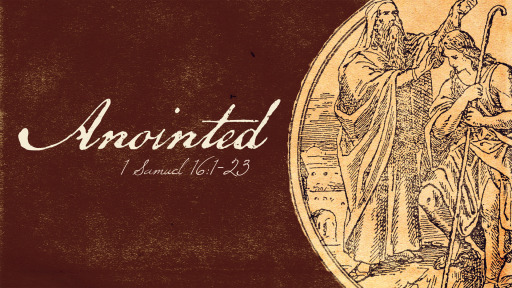1 Samuel 16

Have you ever been anointed?
Intro
As a religious act, anointing was meant to endow the anointed one with the quality of the deity involved. From ancient times the Hebrews inaugurated officers of their national community by pouring special oil on the head of the person designated for office. The same practice was used to set objects apart for special divine use. The Hebrew word for anoint first appears in Genesis 31:13, where it refers to Jacob pouring oil on the stone of Bethel (Gn 28:18, 19).
Scripture supplies few details of the ceremonial anointings of official things and persons. Jacob simply poured oil on a rock with an accompanying pronouncement, following some immemorial custom of the Near East. When anointing Israel’s first king, the prophet-judge Samuel took Saul aside for instruction (1 Sm 9:25–27), then “took a vial of oil and poured it on his head, and kissed him and said ‘Has not the Lord appointed you to be prince over his people Israel’ ” (1 Sm 10:1). For anointing the tabernacle and its priests, a special oil was compounded and used only for that sacred purpose. Skilled perfume makers blended the choicest spices (myrrh, cinnamon, sweet cane, cassia) in olive oil (Ex 30:22–25). The Lord specified that everything set apart for God—the tabernacle, the ark, the table and its instruments, the lampstand and utensils, the incense altar and main altar, the washbasin—was to be anointed. Aaron the high priest and his sons the priests were also to be anointed (Ex 30:26–32). The result was a holy place with holy furnishings, holy implements of worship, and holy ministers.
Prayer
Message
21 Then a spirit came forward and stood before the LORD, saying, ‘I will entice him.’
22 And the LORD said to him, ‘By what means?’ And he said, ‘I will go out, and will be a lying spirit in the mouth of all his prophets.’ And he said, ‘You are to entice him, and you shall succeed; go out and do so.’
23 Now therefore behold, the LORD has put a lying spirit in the mouth of all these your prophets; the LORD has declared disaster for you.”
Jesus and Beelzebul
14 Now he was casting out a demon that was mute. When the demon had gone out, the mute man spoke, and the people marveled.
15 But some of them said, “He casts out demons by Beelzebul, the prince of demons,”
16 while others, to test him, kept seeking from him a sign from heaven.
17 But he, knowing their thoughts, said to them, “Every kingdom divided against itself is laid waste, and a divided household falls.
18 And if Satan also is divided against himself, how will his kingdom stand? For you say that I cast out demons by Beelzebul.
19 And if I cast out demons by Beelzebul, by whom do your sons cast them out? Therefore they will be your judges.
20 But if it is by the finger of God that I cast out demons, then the kingdom of God has come upon you.
21 When a strong man, fully armed, guards his own palace, his goods are safe;
22 but when one stronger than he attacks him and overcomes him, he takes away his armor in which he trusted and divides his spoil.
23 Whoever is not with me is against me, and whoever does not gather with me scatters.
Return of an Unclean Spirit
24 “When the unclean spirit has gone out of a person, it passes through waterless places seeking rest, and finding none it says, ‘I will return to my house from which I came.’
25 And when it comes, it finds the house swept and put in order.
26 Then it goes and brings seven other spirits more evil than itself, and they enter and dwell there. And the last state of that person is worse than the first.”
